
Goring & Streatley railway station is on the Great Western Main Line, serving the twin villages of Goring-on-Thames in Oxfordshire and Streatley in Berkshire. The station is located in Goring-on-Thames, adjacent to the village centre, and is five minutes' walk from Goring and Streatley Bridge; this connects the village with Streatley, across the River Thames. It is 44 miles 60 chains (72.0 km) down the line from ‹See TfM›London Paddington and is situated between Pangbourne to the east and Cholsey to the west. It is served by local services operated by Great Western Railway (GWR)
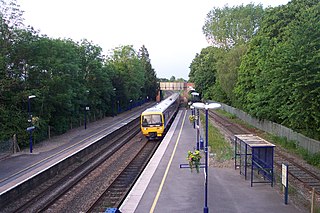
Aldermaston railway station serves the village of Aldermaston in Berkshire, England. The station is at nearby Aldermaston Wharf and about 2 miles (3 km) north of Aldermaston village. It is 44 miles 63 chains measured from ‹See TfM›London Paddington.

Didcot Parkway is a railway station serving Didcot, a town in Oxfordshire, England. The station was opened as Didcot on 12 June 1844 and was renamed Didcot Parkway on 29 July 1985 by British Rail, to reflect its role as a park and ride railhead. It is 53 miles 10 chains down the line from ‹See TfM›London Paddington and is situated between Cholsey to the east and Swindon to the west.

Alfreton railway station serves the town of Alfreton in Derbyshire, England. The station is on the Erewash Valley Line 18+1⁄4 miles (29.4 km) north of Nottingham and 9+3⁄4 miles (15.7 km) south of Chesterfield.

Oxford railway station is a mainline railway station, one of two serving the city of Oxford, England. It is about 0.5 miles (800 m) west of the city centre, north-west of Frideswide Square and the eastern end of Botley Road. It is the busiest station in Oxfordshire, and the fourth busiest in South East England.
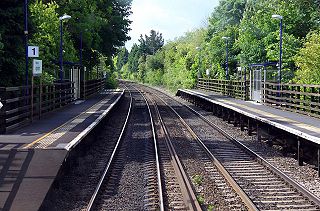
The Cherwell Valley line is the railway line between Didcot and Banbury via Oxford. It links the Great Western Main Line and the south to the Chiltern Main Line and the Midlands. The line follows the River Cherwell for much of its route between Banbury and Oxford.

Banbury railway station serves the historic market town of Banbury in Oxfordshire, England. The station is a stop on the Chiltern Main Line; it is operated by Chiltern Railways and has four platforms in use.

Kings Sutton railway station serves the village of King's Sutton and the nearby town of Brackley in Northamptonshire, England. The station is managed by Chiltern Railways, which provides most of the services including from London Paddington and Marylebone to Oxford and Banbury. It is the least used station in the county of Northamptonshire.
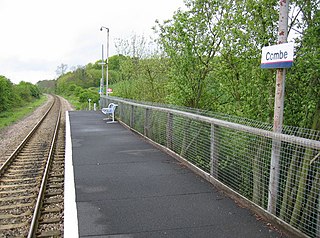
Combe railway station serves the village of Combe in Oxfordshire, England. It is on the Cotswold Line. This station and all trains serving it are run by Great Western Railway.

Tackley railway station is on the Cherwell Valley Line in Oxfordshire, England, serving the village of Tackley and its surrounding area. Great Western Railway operates the station and all but one of the trains serving it. The exception is a weekday late night service to Banbury operated by Chiltern Railways.

Radley railway station serves the villages of Radley and Lower Radley and the town of Abingdon, in Oxfordshire, England.

Culham railway station serves the village of Culham in Oxfordshire, England. It is on the Cherwell Valley Line between Didcot Parkway and Banbury, 56 miles 17 chains (90.5 km) from ‹See TfM›London Paddington. It is served by local train services provided by Great Western Railway.
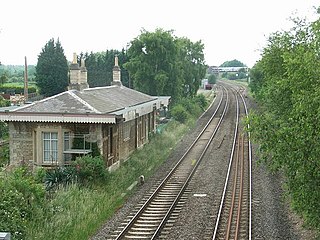
Aynho for Deddington railway station was a railway station serving the village of Aynho in Northamptonshire, England. It was on what is now known as the Cherwell Valley Line.

Milton Halt railway station is a former railway station that served the village of Milton in northern Oxfordshire, England.
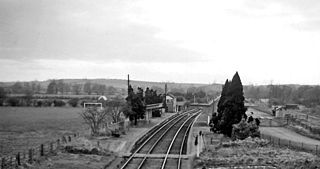
Bloxham railway station served the village of Bloxham in northern Oxfordshire, England.
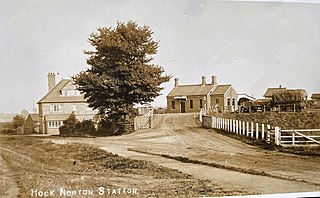
Hook Norton railway station served the village of Hook Norton in northern Oxfordshire, England.
Rollright Halt railway station served the village of Great Rollright in Oxfordshire, England.

Chipping Norton railway station served the town of Chipping Norton, Oxfordshire, England. The station had two platforms and a signal box. It was closed in 1964 and site now forms part of an industrial estate.
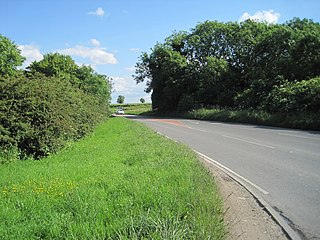
Shipton-on-Cherwell Halt was a railway halt constructed in 1929 by the Great Western Railway to serve the Oxfordshire village of Shipton-on-Cherwell as well as the adjacent Oxford and Shipton Cement Company limestone quarry and cement works.
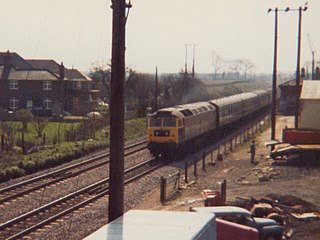
Kidlington railway station is a former railway station in Oxfordshire, England, that opened in 1855 on the Oxford and Rugby Railway to serve the village of Kidlington and the adjacent town of Woodstock. It became a junction station in 1890 upon the opening of the Blenheim and Woodstock Branch Line, and served the area for over 100 years before falling victim to the programme of closures initiated by the Beeching Report in 1964. Following many proposals for its reopening, a new station to serve Kidlington opened in October 2015 at Oxford Parkway on the Oxford to Bicester Line.



















